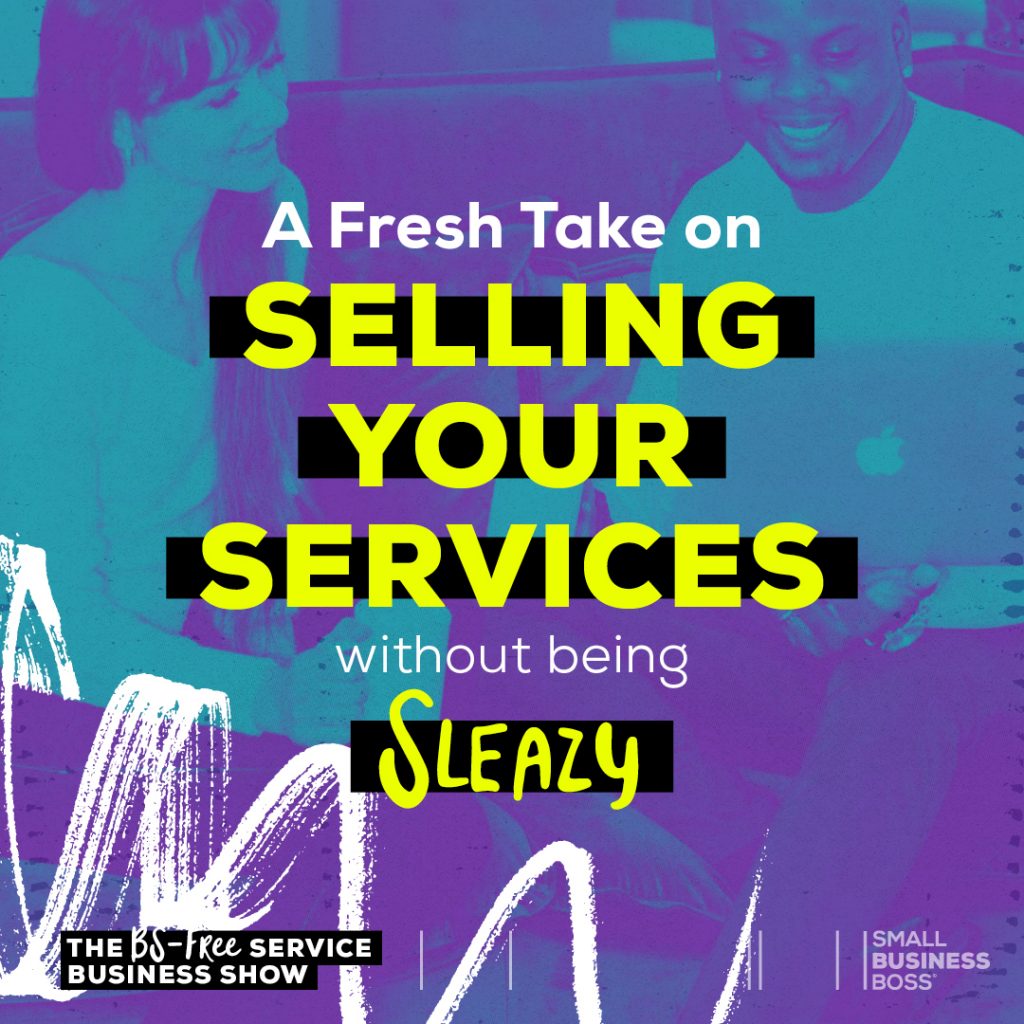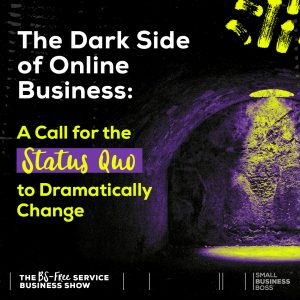
Search the site:
A Fresh Take on Selling Your Services Without Being Sleazy
How do you really feel about selling? Are you resistant? Unsure? Terrified? Or simply convinced you could do better? No matter how you feel about sales, there’s no getting around the need to sell. Which is why in this episode we’re breaking down how to sell your services without being sleazy, and digging into everything that’s made you doubt or question your approach to sales.
There are a lot of things that I have problems with in the current online business environment, but one of my top three are how sales are being done in a manipulative, downright dodgy way.
The current climate for sales is particularly disturbing as it has people parting with their money thanks to predatory and coercive business practices. People are being sold a dream and scammed out of their money by the thousands.
I know this seems dramatic, but it’s the reality of online business. And while we like to pass judgment on MLMs and cults, there’s a lot happening in this industry that’s the exact same.
Think of it as being “influenced” by celebrity entrepreneurs who instead of selling you the dream of a perfect life because of a specific lip gloss, are selling you a dream business. And unlike a $20 lip gloss that you can easily take or leave, the stakes are much, much higher, as hundreds or even thousands of dollars are at stake. Not to mention the way we’re being sold to is designed to exploit your insecurities.
The survey I did earlier this year on online business investments illustrates exactly how bad this problem really is. When asked why they’d made an investment, 68.3% of respondents said they’d done so because of the use of high pressure sales tactics and the heavy use of FOMO.
These high pressure sales tactics combined with a “invest at all costs” narrative means people are making investments they can’t afford. In the same survey I asked if they’d made a purchase they couldn’t comfortably afford, nearly 71% of people said yes.
The problem is compounded by sunk cost fallacy where we continue to invest because we think we’ve already invested so much that we might as well continue. I know I’ve definitely done this kind of engaging in magical thinking, where I wanted to believe the next investment would be the one that would make all the difference.
All of that to say, the business as usual sales tactics in online business are doing real harm, and as business owners, this is no way to run a business. It’s no wonder that we hold back from selling as these tactics feel disgusting. Or we’re stuck in a script that we’re bad at sales as we just can’t bring ourselves to screw people over.
The Sales Status Quo: Let’s Talk about Alternatives
Just like we talked about with marketing, when it comes to sales, there’s another way. And the reality is that how sales are done in online business are more aligned with con artists and scammers than how sales professionals outside this industry actually get deals done.
Over the course of my career I’ve worked closely with sales teams. One of my first jobs out of college was as a sales support specialist, and in my agency, one of our current clients is a sales company.
Never in my life in real-world sales have I seen the kind of bullshit tactics I see in online business. If these people can do multi-million dollar deals without trickery and deceit, we sure as hell can.
What the best sales people I’ve ever worked with have in common is that they know how to build relationships. They know how to earn and keep the trust of the potential client.
Which is why for all of us out here trying to sell our services, we need to take a long, hard look at the strategies and tactics we may be using, and focus on relationships, and most of all, trust.
Just like we did in the last episode, we’re going to go through the high pressure sales tactics that bank on fear and shame, and the alternatives using my TrustDNA Method.
Truth
As we discussed in the last episode on bro marketing, it’s not uncommon for the online business world to have a loose relationship with the truth.
If you want to build a business based on truth, telling the truth is the bare minimum. Truth is about leading with your authority and your values, and I’d hope that your values as a human include being truthful.
In the current state of online business, the truth is twisted in order to make the sale and it shows up in so many ways.
First, it’s about lying about potential outcomes, what to expect and who the program is best for. And then there’s the entire issue of people trying to get the sale today by saying the price will go up, it’s going away, or any other tricks.
The goal is to make the sale at all costs and banking on people’s faith.
As service business owners, we need to sell only to clients who are a fit and can be successful. You are NOT for everyone, and you shouldn’t serve every single potential client.
I get that we all need to make money, but when you’re playing fast and loose with the truth, you’re setting yourself up for future pain. You may make the sale, but you’re going to find yourself dealing with a relationship built on broken trust which is always going to backfire later.
Buyer’s remorse is real and really, why do that to yourself?
Honesty is always the best policy.
Transparency
Transparency is about consistency and ensuring that what your potential clients see is what they get.
Please keep in mind that transparency doesn’t mean that you have to have your entire life splashed online, but rather that you’re not bringing the flash in your marketing or sales and then failing to deliver once money changes hands.
I have so many examples I could share here of lack of transparency, but one of the one that’s become a super common sales tactic is hiding the price on sales pages.
Before I talk about this one, I know the reasons why people do it, but I’m not onboard. I’m not talking about where a proposal is needed, but rather packed services or group programs where you have to do a sales call or watch a webinar to get the info.
This gating of information lacks transparency, and it’s a way to force you into a deeper sales discussion without having the details. Plus, it creates needless friction in the sales process and can result in power dynamics that push people into a sale.
The alternative to this is having clear and easy-to-find pricing and a sales process that’s providing the information needed to make an informed decision before engaging.
There are many other ways that a lack of transparency shows up, from not fully answering questions, to alluding to program benefits that don’t materialize.
With a trust-driven approach to your sales, ask yourself how you can ensure that people know what they need to know, and you can be consistent so that what people see is what they get.
Remember, just because these tactics work, or they’re commonly used, it doesn’t mean that they’re needed to make sales.
Time
In the sales process, time is a critical way we can build or break trust, and it’s one that’s seriously underestimated.
Think about some of your sales experiences, especially ones where you had regret after the fact. I’m willing to bet that you felt pressure to make a decision and that you were sped through the process in a way that resulted in your trust being overridden.
A sales process based on trust should offer you realistic, supportive timeframes. That means that you’re not pressuring people to buy, or using scarcity tactics that result in people being forced to make a decision.
The bigger the investment, the more time you should provide for people to make a decision. With your services and offers, think about how you can provide space for people to make the right decision for themselves.
Another way to build more trust in your sales is by normalizing people waiting to work with you. Support them in working with you when the time is right, and not pulling out all kinds of tricks to trap them into saying yes now.
Results
Next up, let’s talk about results, because when someone spends money with you, they’re looking for your help with a specific challenge they’re having in their business or life.
Remember when I talked about the top 10% testimonials in marketing that mislead us? The same goes in our sales. We need to be crystal clear about what it will take to get ROI or results from the services we offer.
For me, that’s been getting clear on what I can really do for my clients, and not overpromising. I get it, in the heat of the moment, we want to do what it takes to make the sale, but when we’re overpromising, we’re disrespecting our potential client.
Maybe it’s insecurity. Maybe it’s a lack of faith in ourselves, but we owe it to our clients to be clear about outcomes.
Think about how you can do what you say you’re doing to do in terms of results for your potential clients.
Our sales process should be about managing expectations, and not amping them up so that there’s no way to make the client happy once they get started. And if we’re not able to meet a potential client’s expectations, we’re better off letting them go than proceeding to work with them when they’re simply not a good fit.
Respect
Without respect, there’s no way to build trust. Sure, you may make the sale, but that entire relationship is going to be full of problems.
If you’ve heard of the know, like and trust factor, the way that’s executed in online business to make the sale is to go from know to trust in a way that’s designed to do so at hyperspeed.
There’s no real respect in that. Again, it’s about saying whatever is needed to make the sale, and often that’s actually done in a way that’s degrading and has people buying because they feel bad about themselves.
In your sales process everyone should be treated with fairness and dignity. Period. That should be a non-negotiable.
So what does that look like?
It’s about how we engage with people considering making investments with us. If you’re using shame, fear or anything else, you’re dishing up disrespect.
Sales should be a conversation, and we need to show up in a way that doesn’t play on anyone’s insecurities or prioritizes your need to make the sale over what’s best for them.
Ask yourself how you can foster self-trust with potential clients. This can be as subtle as giving them space to make an informed decision, providing an opportunity to ask as many questions as they need to be comfortable or skipping any coercive tactics that play on fear or the “invest at all costs” message.
Put Service First in Your Sales
When it comes to sales, we’ve got a choice. We can stick with the status quo of what’s done in online business, or we can do sales in a way that’s about truly serving our potential clients. A way that puts trust above all else because we value and respect the person we’re selling to.
None of the sleazy sales tactics we talked about today from hiding prices to pushing people to buy are needed here in 2021. And if you’re building your business on these, you’re likely going to struggle with your sales, or feel out of integrity when you do land a client.
It’s not worth it.
There’s absolutely no reason that we need to accept that the way things are done in online business for a second longer. Your potential clients deserve better.
Would you show up differently if you knew you were selling in a way that resulted in a win-win for you and your potential client?
In my business, the more I focus on trust and scrubbing these sleazy sales practices out of my business, the more I love my clients because they’re the right fit. They’re not showing up with unrealistic expectations and spending money they simply don’t have.
Putting trust, and these five trust cores at the heart of your sales process won’t steer you wrong. Think of each of these as a trail marker for you to figure out the best possible way for you to do sales for your business.
Remember, TrustDNA is a method, not a rigid, cookie cutter framework that’s designed to force you into anything. You get to choose how you do this and make it work for your business. By focusing on truth, transparency, time, respect and results in your sales, you’ll be able to analyze each tactic and figure out if it’s truly right for you.

I’m Maggie Patterson (she/her), and services businesses are my business.
I have 20+ years of experience with client services, am a consultant for agency owners, creatives, and consultants, and vocal advocate for humane business practices rooted in empathy, respect, and trust.
Read or Listen to the Latest
For Solo Business Owners

Growing a solo service business is tough.
It’s even harder when you’re bombarded with BS advice that steers you away from your values and why you started your business in the first place.
This is the podcast for solo creatives and consultants who want to remain as a team of one and have zero interest in the hustle and grind of typical business teachings.
Subscribe now and never miss an episode.
For Micro Agency Owners
Most podcasts for agency owners obsess over revenue growth as the ultimate success metric.

But here’s the truth: not everyone wants to make millions. Your goal might be to build a sustainable business that lets you have a life and doesn’t run you into the ground.
Join me as I spill my shameless confessions and share everything I’ve learned about building a micro agency that skips the BS of tired and typical agency teachings.
Follow Now on All Major Podcast Platforms








